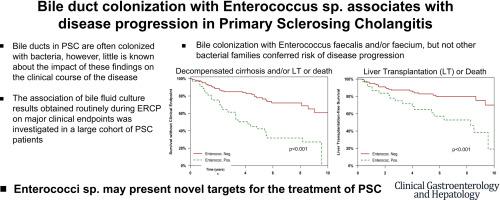Clinical Gastroenterology and Hepatology ( IF 11.6 ) Pub Date : 2022-09-16 , DOI: 10.1016/j.cgh.2022.09.006 Ehud Zigmond 1 , Britta Franziska Zecher 2 , Anna-Lena Bartels 2 , Tomer Ziv-Baran 3 , Thomas Rösch 4 , Guido Schachschal 4 , Ansgar W Lohse 2 , Hanno Ehlken 5 , Christoph Schramm 6

|
Background & Aims
Primary sclerosing cholangitis (PSC) is characterized by chronic inflammation of the biliary mucosa. Bile ducts in PSC are often colonized with bacteria. Although accumulating evidence demonstrates the importance of microbiota for mucosal immunity, little is known about the impact of bile duct colonization with bacteria on the clinical course of PSC.
Methods
Bile samples were sent to culture during endoscopic retrograde cholangio-pancreatography before the administration of peri-interventional antibiotics. Procedures during overt bacterial cholangitis or with prior antibiotic treatment were excluded. The primary endpoint was defined as a composite clinical endpoint of decompensated cirrhosis and/or liver transplantation or death.
Results
A cohort of 189 patients with 591 bile fluid cultures was included. In multivariable Cox regression analysis, the presence of Enterococci (present in 28% of the patients), but not of other bacterial species, conferred risk of disease progression with a hazard ratio of 3.61 (95% confidence interval, 1.6–8.11; P = .002) to reach the composite clinical endpoint. Fungobilia, present in 19.6% of patients, was confirmed to associate with disease progression with a hazard ratio of 3.25 (95% confidence interval, 1.87–5.66; P < .001) to reach the composite clinical endpoint.
Conclusions
The novel association of biliary colonization by Enterococci with disease progression underlines the importance of microbiota-mucosal interplay for the pathogenesis of PSC. These results should stimulate further mechanistic studies on the role of microbiota in PSC and highlight potential new therapeutic targets for a disease without effective treatment options.
中文翻译:

胆管定植肠球菌属。与原发性硬化性胆管炎疾病进展的相关性
背景与目标
原发性硬化性胆管炎(PSC)的特征是胆道粘膜的慢性炎症。PSC 中的胆管经常有细菌定植。尽管越来越多的证据表明微生物群对粘膜免疫的重要性,但人们对细菌定植于胆管对 PSC 临床病程的影响知之甚少。
方法
在围介入抗生素给药之前,在内窥镜逆行胰胆管造影期间将胆汁样本送去培养。明显的细菌性胆管炎期间或之前接受抗生素治疗的手术被排除在外。主要终点被定义为失代偿性肝硬化和/或肝移植或死亡的复合临床终点。
结果
纳入了 189 名患者的队列,进行了 591 份胆汁培养物。在多变量 Cox 回归分析中,肠球菌(存在于 28% 的患者中)而非其他细菌种类的存在会带来疾病进展的风险,风险比为 3.61(95% 置信区间,1.6–8.11 ;P = .002) 达到复合临床终点。19.6% 的患者中存在真菌,被证实与疾病进展相关,达到复合临床终点的风险比为 3.25(95% 置信区间,1.87-5.66; P < .001)。
结论
肠球菌胆道定植与疾病进展的新关联强调了微生物群-粘膜相互作用对于 PSC 发病机制的重要性。这些结果应该会刺激对微生物群在 PSC 中的作用进行进一步的机制研究,并强调针对没有有效治疗方案的疾病的潜在新治疗靶点。











































 京公网安备 11010802027423号
京公网安备 11010802027423号